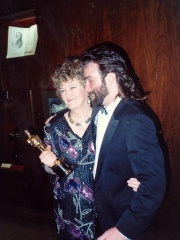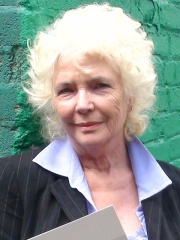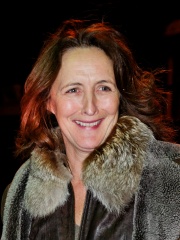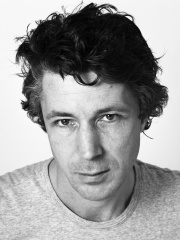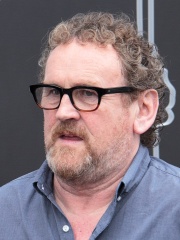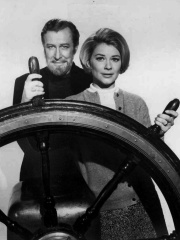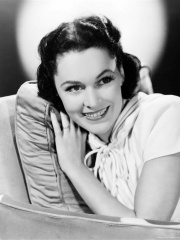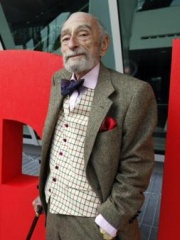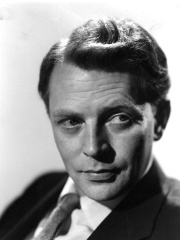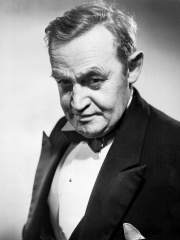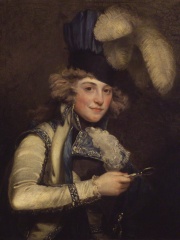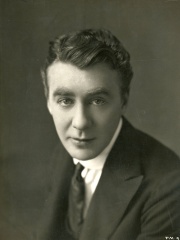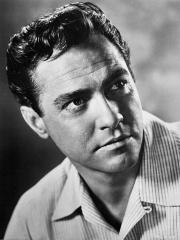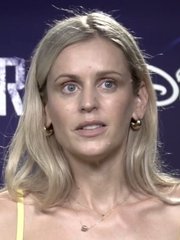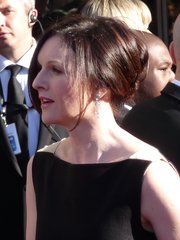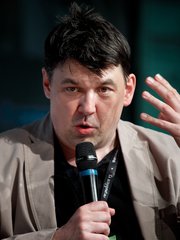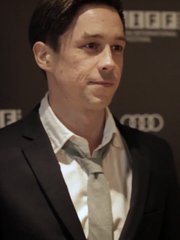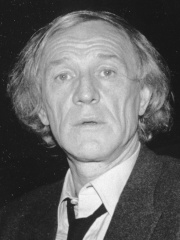
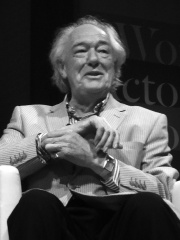
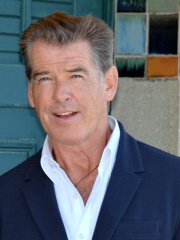
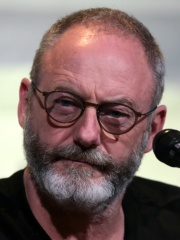
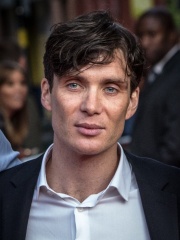
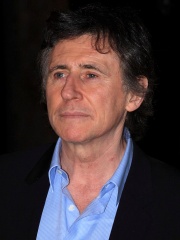
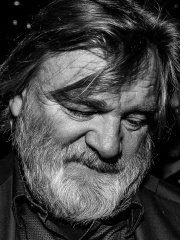
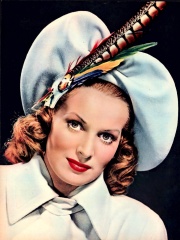
The Most Famous
ACTORS from Ireland
Top 10
The following people are considered by Pantheon to be the top 10 most legendary Irish Actors of all time. This list of famous Irish Actors is sorted by HPI (Historical Popularity Index), a metric that aggregates information on a biography's online popularity. Visit the rankings page to view the entire list of Irish Actors.

1. Richard Harris (1930 - 2002)
With an HPI of 82.51, Richard Harris is the most famous Irish Actor. His biography has been translated into 66 different languages on wikipedia.
Richard St John Francis Harris (1 October 1930 – 25 October 2002) was an Irish actor and singer. Having studied at the London Academy of Music and Dramatic Art, he rose to prominence as an icon of the British New Wave. He received numerous accolades including the Cannes Film Festival Award for Best Actor, a Grammy Award, and a Golden Globe. In 2020 he was listed at number 3 on The Irish Times's list of Ireland's greatest film actors. Harris received two Academy Award for Best Actor nominations for his performances in This Sporting Life (1963), and The Field (1990). Other notable roles include in The Guns of Navarone (1961), Red Desert (1964), A Man Called Horse (1970), Cromwell (1970), Unforgiven (1992), Gladiator (2000), and The Count of Monte Cristo (2002). He gained cross-generational acclaim for his role as Albus Dumbledore in the first two Harry Potter films: Harry Potter and the Philosopher's Stone (2001) and Harry Potter and the Chamber of Secrets (2002), the latter of which was his final film role. He portrayed King Arthur in the 1967 film Camelot based on the Lerner and Loewe musical of the same name. For his performance, he received the Golden Globe Award for Best Actor – Motion Picture Musical or Comedy. He reprised the role in the 1981 Broadway musical revival. He received a Laurence Olivier Award for Best Actor nomination for his role in Pirandello's Henry IV (1991). Harris received a Primetime Emmy Award for Outstanding Lead Actor in a Limited Series or Movie nomination for his role in The Snow Goose (1971). Harris had a number-one singing hit in Australia, Jamaica and Canada, and a top-ten hit in the United Kingdom, Ireland, and the United States with his 1968 recording of Jimmy Webb's song "MacArthur Park". He received a Grammy Award for Best Male Pop Vocal Performance nomination for the song.

2. Michael Gambon (1940 - 2023)
With an HPI of 75.66, Michael Gambon is the 2nd most famous Irish Actor. His biography has been translated into 63 different languages.
Sir Michael John Gambon (; 19 October 1940 – 27 September 2023) was an Irish-English actor. Gambon started his acting career with Laurence Olivier as one of the original members of the Royal National Theatre. Over his six-decade-long career, he received three Olivier Awards, four BAFTA TV Awards, and two Screen Actors Guild Awards. In 1998, he was knighted by Queen Elizabeth II for services to drama. Gambon appeared in many productions of works by William Shakespeare such as Othello, Hamlet, Macbeth, and Coriolanus. Gambon was nominated for thirteen Olivier Awards, winning three times for A Chorus of Disapproval (1985), A View from the Bridge (1987), and Man of the Moment (1990). In 1997, Gambon made his Broadway debut in David Hare's Skylight, earning a Tony Award for Best Actor in a Play nomination. Gambon made his film debut in Othello (1965). His other notable films include The Cook, the Thief, His Wife & Her Lover (1989), The Wings of the Dove (1997), The Insider (1999), Gosford Park (2001), Amazing Grace (2006), The King's Speech (2010), Quartet (2012), and Victoria & Abdul (2017). He also acted in the Wes Anderson films The Life Aquatic with Steve Zissou (2004) and Fantastic Mr. Fox (2009). He gained wider recognition through his role of Albus Dumbledore in the Harry Potter film series from 2004 to 2011, replacing Richard Harris following his death in 2002. For his work on television, he received four BAFTA Awards for The Singing Detective (1986), Wives and Daughters (1999), Longitude (2000) and Perfect Strangers (2001). He also received two Primetime Emmy Award nominations for Path to War (2002), and Emma (2009). Gambon's other notable projects include Cranford (2007), and The Casual Vacancy (2015). In 2017, he received the Irish Film & Television Academy Lifetime Achievement Award. In 2020, he was listed at No. 28 on The Irish Times's list of Ireland's greatest film actors.

3. Pierce Brosnan (b. 1953)
With an HPI of 74.54, Pierce Brosnan is the 3rd most famous Irish Actor. His biography has been translated into 90 different languages.
Pierce Brendan Brosnan (born 16 May 1953) is an Irish actor and film producer. He was the sixth actor to play the lead role in the James Bond films, and the fifth for Eon Productions, which produces the official Bond films. Brosnan starred as Bond four times from 1995 to 2002: GoldenEye, Tomorrow Never Dies, The World Is Not Enough, and Die Another Day. After leaving school at 16, Brosnan trained in commercial illustration before attending the Drama Centre in London for three years. Following a stage acting career, he rose to popularity in the television series Remington Steele (1982–1987). After its conclusion, Brosnan appeared in films, including The Fourth Protocol (1987) and Mrs. Doubtfire (1993). After achieving worldwide fame as James Bond, Brosnan toplined other major films including Dante's Peak (1997) and the remake of The Thomas Crown Affair (1999). Post-Bond, he has starred in The Ghost Writer (2010), Percy Jackson & the Olympians: The Lightning Thief (2010), The November Man (2014), Mamma Mia! (2008) and its sequel Mamma Mia! Here We Go Again (2018), and Eurovision Song Contest: The Story of Fire Saga (2020). In 2022, Brosnan played Kent Nelson / Doctor Fate in the DC Extended Universe film Black Adam. Brosnan also narrated the 2008 Thomas & Friends movie The Great Discovery. Brosnan has received two Golden Globe Award nominations, for Nancy Astor (1982) and The Matador (2005). In 1996, he and the American film producer Beau St. Clair founded the production company Irish DreamTime. He is also known for charitable work and environmental activism. In 1997, he received a star on the Hollywood Walk of Fame for his contributions to the film industry. In 2020, he was listed at No. 15 on The Irish Times' list of the greatest Irish film actors.

4. Liam Cunningham (b. 1961)
With an HPI of 70.48, Liam Cunningham is the 4th most famous Irish Actor. His biography has been translated into 39 different languages.
Liam Cunningham (born 2 June 1961) is an Irish actor. He is known for playing Davos Seaworth in the HBO epic-fantasy series Game of Thrones. Cunningham has been nominated for the London Film Critics' Circle Award, the British Independent Film Award, has won two Irish Film & Television Awards, and shared a BAFTA with Michael Fassbender, for their crime-drama short film Pitch Black Heist. His film roles include War of the Buttons (1994), A Little Princess (1995), Jude (1996), Dog Soldiers (2002), The Crooked Man (2003), The Wind That Shakes the Barley (2006), Hunger (2008), The Escapist (2008), The Mummy: Tomb of the Dragon Emperor (2008), Good Vibrations (2013), Let Us Prey (2014) and The Childhood of a Leader (2015). In 2020, he was listed at number 36 on The Irish Times list of Ireland's greatest film actors.
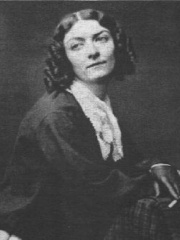
5. Lola Montez (1821 - 1861)
With an HPI of 70.44, Lola Montez is the 5th most famous Irish Actor. Her biography has been translated into 37 different languages.
Eliza Rosanna Gilbert (17 February 1821 – 17 January 1861), better known by the stage name Lola Montez (), was an Irish dancer and actress who became famous as a Spanish dancer, courtesan, and mistress of King Ludwig I of Bavaria, who made her Gräfin (Countess) von Landsfeld. At the start of the Revolutions of 1848 in the German states, she was forced to flee. She proceeded to the United States via Austria, Switzerland, France and London, to return to her work as an entertainer and lecturer.

6. Cillian Murphy (b. 1976)
With an HPI of 69.06, Cillian Murphy is the 6th most famous Irish Actor. His biography has been translated into 81 different languages.
Cillian Murphy ( KILL-ee-ən; born 25 May 1976) is an Irish actor. His works encompass both stage and screen, and his accolades include an Academy Award, a BAFTA Award, and a Golden Globe Award. He made his professional debut in Enda Walsh's 1996 play Disco Pigs, a role he later reprised in the 2001 screen adaptation. His early film credits include the horror film 28 Days Later (2002), the dark comedy Intermission (2003), the thriller Red Eye (2005), the Irish war drama The Wind That Shakes the Barley (2006), and the science fiction thriller Sunshine (2007). He played a transgender Irish woman in the comedy-drama Breakfast on Pluto (2005), which earned him his first Golden Globe Award nomination. Murphy began his collaboration with filmmaker Christopher Nolan in 2005, playing the Scarecrow in The Dark Knight trilogy (2005–2012) as well as appearing in Inception (2010) and Dunkirk (2017). He gained greater prominence for his role as Tommy Shelby in the BBC period drama series Peaky Blinders (2013–2022) and for starring in the horror sequel A Quiet Place Part II (2020). Murphy portrayed J. Robert Oppenheimer in Nolan's Oppenheimer (2023), for which he won the BAFTA and Academy Award for Best Actor.

7. Gabriel Byrne (b. 1950)
With an HPI of 68.61, Gabriel Byrne is the 7th most famous Irish Actor. His biography has been translated into 47 different languages.
Gabriel James Byrne (born 12 May 1950) is an Irish actor. He has received a Golden Globe Award as well as nominations for a Grammy Award, two Primetime Emmy Awards and two Tony Awards. Byrne was awarded the Irish Film and Television Academy Lifetime Achievement Award in 2018 and was listed at number 17 on The Irish Times list of Ireland's greatest film actors in 2020. In 2009 The Guardian named him one of the best actors never to have received an Academy Award nomination. Byrne's acting career began at the Focus Theatre in Dublin before he joined London's Royal Court Theatre in 1974. His screen debut came in the Irish drama serial The Riordans and the spin-off show Bracken. He went on to star in such films as Defence of the Realm (1986), Lionheart (1987), Miller's Crossing (1990), Little Women (1994), Dead Man (1995), The Usual Suspects (1995), The Man in the Iron Mask (1998), Enemy of the State (1998), Vanity Fair (2004), The 33 (2015), and Hereditary (2018). He co-wrote The Last of the High Kings (1996) and also produced In the Name of the Father (1993). For his Broadway work, Byrne has received two nominations for the Tony Award for Best Actor in a Play for his roles in the Eugene O'Neill plays A Moon for the Misbegotten (2000), and Long Day's Journey into Night (2016). For his television work, Byrne has received two nominations for the Primetime Emmy Award for Outstanding Lead Actor in a Drama Series for his role as Paul Weston in the HBO drama series In Treatment (2008–2010), he also received a Golden Globe Award. His other notable television roles include Vikings (2013), Maniac (2018), and War of the Worlds (2019–2022).

8. Brendan Gleeson (b. 1955)
With an HPI of 68.55, Brendan Gleeson is the 8th most famous Irish Actor. His biography has been translated into 53 different languages.
Brendan Gleeson (born 29 March 1955) is an Irish actor. He has received various accolades, including a Primetime Emmy Award, two British Independent Film Awards and three IFTA Awards, along with nominations for an Academy Award, three BAFTA Awards and five Golden Globe Awards. In 2020, he was listed at number 18 on The Irish Times list of Ireland's greatest film actors. He is the father of actors Domhnall Gleeson and Brian Gleeson. He is known for his supporting roles in films such as Braveheart (1995), Michael Collins (1996), 28 Days Later (2002), Gangs of New York (2002), Cold Mountain (2003), Troy (2004), the Harry Potter film series (2005–2010), Suffragette (2015), Paddington 2 (2017), The Ballad of Buster Scruggs (2018), and The Tragedy of Macbeth (2021). He is also known for his leading roles in films such as The General (1998), In Bruges (2008), The Guard (2011), Calvary (2014), Frankie (2019), and The Banshees of Inisherin (2022) for which he received a nomination for the Academy Award for Best Supporting Actor. He won a Primetime Emmy Award in 2009 for his portrayal of Winston Churchill in the television film Into the Storm. He also received a Golden Globe Award nomination for his performance as Donald Trump in the Showtime series The Comey Rule (2020). From 2017 to 2019 he starred in the crime series Mr. Mercedes. He received an Emmy Award nomination for Stephen Frears' Sundance TV series State of the Union (2022).

9. Maureen O'Hara (1920 - 2015)
With an HPI of 67.19, Maureen O'Hara is the 9th most famous Irish Actor. Her biography has been translated into 55 different languages.
Maureen O'Hara (née FitzSimons; 17 August 1920 – 24 October 2015) was an Irish and American actress who became successful in Hollywood from the 1940s through to the 1960s. She was a natural redhead who was known for playing passionate but sensible heroines, often in Westerns and adventure films. She worked with director John Ford and long-time friend John Wayne on numerous projects. O'Hara was born into a Catholic family and raised in Dublin, Ireland. She aspired to become an actress from a very young age. She trained with the Rathmines Theatre Company from the age of 10 and at the Abbey Theatre from the age of 14. She was given a screen test, which was deemed unsatisfactory, but Charles Laughton saw potential in her and arranged for her to co-star with him in Alfred Hitchcock's Jamaica Inn in 1939. Laughton insisted that she change her surname from FitzSimons against her wishes, and she became "O'Hara". She moved to Hollywood the same year to appear with him in the production of The Hunchback of Notre Dame, and was given a contract by RKO Pictures. From there, she went on to enjoy a long and highly successful career, and acquired the nickname "the Queen of Technicolor". O'Hara appeared in films such as How Green Was My Valley (1941) (her first collaboration with John Ford), The Black Swan with Tyrone Power (1942), The Spanish Main (1945), Sinbad the Sailor (1947), the Christmas classic Miracle on 34th Street (1947) with John Payne and Natalie Wood, and Comanche Territory (1950). O'Hara made her first film with John Wayne, the actor with whom she is most closely associated, in Rio Grande (1950); this was followed by The Quiet Man (1952), The Wings of Eagles (1957), McLintock! (1963) and Big Jake (1971). Such was her strong chemistry with Wayne that many assumed they were married or in a relationship. In the 1960s, O'Hara increasingly turned to more motherly roles as she aged, appearing in films such as The Deadly Companions (1961), The Parent Trap (1961) and The Rare Breed (1966). She retired from the industry in 1971, but returned 20 years later to appear with John Candy in Only the Lonely (1991). In the late 1970s, O'Hara helped run her third husband Charles F. Blair Jr.'s flying business in Saint Croix in the United States Virgin Islands, and edited a magazine, but later sold them to spend more time in Glengarriff in Ireland. She was married three times, and had one daughter, Bronwyn, with her second husband. Her autobiography, 'Tis Herself, published in 2004, became a New York Times bestseller. In 2009, The Guardian named her one of the best actors never to have received an Academy Award nomination. In November 2014, she was presented with an Honorary Academy Award with the inscription "To Maureen O'Hara, one of Hollywood's brightest stars, whose inspiring performances glowed with passion, warmth and strength". In 2020, she was ranked number one on The Irish Times list of Ireland's greatest film actors.
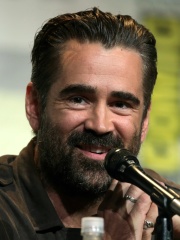
10. Colin Farrell (b. 1976)
With an HPI of 65.59, Colin Farrell is the 10th most famous Irish Actor. His biography has been translated into 64 different languages.
Colin James Farrell (; born 31 May 1976) is an Irish actor. A leading man in blockbusters and independent films since the 2000s, he has received various accolades, including three Golden Globe Awards, one Screen Actors Guild Award, and one Volpi Cup in addition to nominations for an Academy Award, a BAFTA Award and two Primetime Emmy Awards. The Irish Times named him Ireland's fifth-greatest film actor in 2020, and Time magazine named him one of the 100 most influential people in the world in 2023. Farrell began acting in the BBC drama series Ballykissangel (1998) and made his (first credited) film debut in the drama The War Zone (1999). His first lead film role was in the war drama Tigerland (2000), and he made his breakthrough in Steven Spielberg's science fiction film Minority Report (2002). He took on high-profile roles such as Bullseye in Daredevil (2003) and as Alexander the Great in Alexander (2004), with further starring roles in Phone Booth (2002), The Recruit (2003), S.W.A.T. (2003), and Miami Vice (2006). Farrell earned acclaim for playing a novice hitman in his first film with frequent collaborator Martin McDonagh, the dark comedy In Bruges (2008), winning a Golden Globe Award. He went on to play a variety of leading and character roles in the comedy Horrible Bosses (2011), the science fiction film Total Recall (2012), the drama Saving Mr. Banks (2013), the dark comedies Seven Psychopaths (2012) and The Lobster (2015), the thrillers The Killing of a Sacred Deer (2017), The Beguiled (2017) and Widows (2018), and the fantasy films Fantastic Beasts and Where to Find Them (2016) and Dumbo (2019). He also starred in the second season of HBO's thriller series True Detective (2015). In 2022, Farrell gained acclaim for his roles in the science fiction drama After Yang, the survival film Thirteen Lives, and McDonagh's drama The Banshees of Inisherin. For playing a naïve Irishman in the lattermost, he won the Volpi Cup for Best Actor and his second Golden Globe Award, in addition to nominations for the BAFTA and Academy Award for Best Actor. Farrell played Oz Cobb / Penguin in the superhero film The Batman (2022) and the HBO miniseries The Penguin (2024). For the latter, he was nominated for the Primetime Emmy Award for Outstanding Lead Actor in a Limited or Anthology Series or Movie, and won a Golden Globe Award and a Screen Actors Guild Award in the same category.
People
Pantheon has 96 people classified as Irish actors born between 1761 and 2001. Of these 96, 72 (75.00%) of them are still alive today. The most famous living Irish actors include Pierce Brosnan, Liam Cunningham, and Cillian Murphy. The most famous deceased Irish actors include Richard Harris, Michael Gambon, and Lola Montez. As of April 2024, 11 new Irish actors have been added to Pantheon including Ardal O'Hanlon, Denise Gough, and Dervla Kirwan.
Living Irish Actors
Go to all RankingsPierce Brosnan
1953 - Present
HPI: 74.54
Liam Cunningham
1961 - Present
HPI: 70.48
Cillian Murphy
1976 - Present
HPI: 69.06
Gabriel Byrne
1950 - Present
HPI: 68.61
Brendan Gleeson
1955 - Present
HPI: 68.55
Colin Farrell
1976 - Present
HPI: 65.59
Brenda Fricker
1945 - Present
HPI: 65.04
Caitriona Balfe
1979 - Present
HPI: 64.30
Fionnula Flanagan
1941 - Present
HPI: 62.65
Fiona Shaw
1958 - Present
HPI: 61.58
Aidan Gillen
1968 - Present
HPI: 61.16
Colm Meaney
1953 - Present
HPI: 59.84
Deceased Irish Actors
Go to all RankingsRichard Harris
1930 - 2002
HPI: 82.51
Michael Gambon
1940 - 2023
HPI: 75.66
Lola Montez
1821 - 1861
HPI: 70.44
Maureen O'Hara
1920 - 2015
HPI: 67.19
Edward Mulhare
1923 - 1997
HPI: 64.07
Maureen O'Sullivan
1911 - 1998
HPI: 63.68
David Kelly
1929 - 2012
HPI: 61.83
Dan O'Herlihy
1919 - 2005
HPI: 59.26
Barry Fitzgerald
1888 - 1961
HPI: 58.11
Dorothea Jordan
1761 - 1816
HPI: 58.03
Tom Moore
1883 - 1955
HPI: 57.40
Richard Todd
1919 - 2009
HPI: 56.96
Newly Added Irish Actors (2025)
Go to all RankingsArdal O'Hanlon
1965 - Present
HPI: 47.51
Denise Gough
1980 - Present
HPI: 45.42
Dervla Kirwan
1971 - Present
HPI: 42.53
Eva Birthistle
1974 - Present
HPI: 42.31
Daryl McCormack
1993 - Present
HPI: 40.89
Graham Linehan
1968 - Present
HPI: 39.60
Patrick Gibson
1995 - Present
HPI: 38.54
Killian Scott
1985 - Present
HPI: 38.28
Sophie Vavasseur
1992 - Present
HPI: 34.18
Louisa Harland
1993 - Present
HPI: 29.73
Fionn O'Shea
1997 - Present
HPI: 27.23
Overlapping Lives
Which Actors were alive at the same time? This visualization shows the lifespans of the 24 most globally memorable Actors since 1700.

